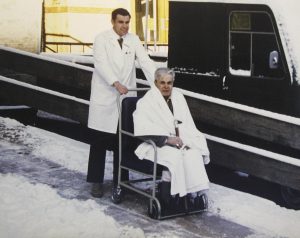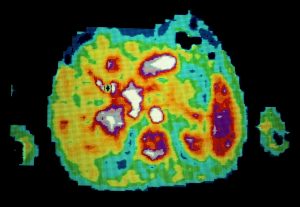Francis William Smith, M.D.
1943 – 2022
Dr. Francis Smith bringing a patient through the snow for MRI in the Medical Physics Department
Colour coded T1 image through abdomen of the first patient to be scanned 28th August 1980. The patient was known to have oesophageal cancer with liver metastases (arrowheads) but, in addition, the scan showed a previously undiagnosed vertebral metastasis (arrow).
Francis William Smith graduated in 1970 in medicine at the University of Aberdeen. His training in medicine, orthopaedic surgery and then radiology was in Aberdeen Royal Infirmary followed by a fellowship at the Hospital for Sick Children in Toronto, Canada. In 1980 he returned to Aberdeen where he pioneered the clinical application of Magnetic Resonance Imaging (MRI) developed by Professor Mallard’s Medical Physics department. Smith undertook the first body clinical examination demonstrating liver metastases in a patient with oesophageal cancer. He started the world’s first clinical trial of MRI in 1980 and the world’s first diagnostic MRI service at Aberdeen Royal Infirmary in 1981. He produced seminal work describing the first clinical applications of MRI in musculoskeletal radiology, head and neck malignancy, liver and pancreatic disease, pelvic malignancy and pregnancy. He had over 250 publications in peer-reviewed Journals, 32 book chapters, and co-authored 5 textbooks, many of which are still referenced today.
In 1982, Smith was the inaugural President of the Society of Magnetic Resonance Imaging and in 1990 he received the Gold medal from the International Society for Magnetic Resonance Imaging. Between 1984–91, he was Editor in Chief of Magnetic Resonance Imaging. In 1999, he was the recipient of the Barclay Medal and in 2009 was the Sir Godfrey Hounsfield Memorial lecturer at the British Institute of Radiology.
Smith pioneered the use of Single Photon Emission Tomography (SPECT) for the measurement of regional cerebral blood flow performing the preclinical evaluation of the technetium labelled blood flow agent Hexamethylpropylene Amine Oxime, as well as publishing the earliest papers in patients with dementia. He was a leader in the use of Positron Emission Tomography (PET) for the diagnosis and staging of malignant disease. He led the Nuclear Medicine and MRI service in Aberdeen Royal Infirmary, specialising in Musculoskeletal Radiology. Smith was passionate about sports medicine, was an examiner for the Diploma in Sport & Exercise Medicine of the Faculty of Sport and Exercise Medicine from 1996–2018 and was Visiting Professor and external examiner in Sports Medicine for the University at the West Indies 2009–2012 and 2016.


